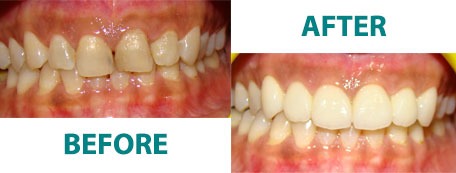Creating the healthy smile you want through science and artistry.
A veneer is thin shell, wafer-thin (approx. 0,5 mm) of porcelain or composite that is bonded to tooth to improve its colour and shape. They can be used to close spaces between teeth, lengthen small or misshapen teeth, or whiten stained or dark teeth, protect teeth from damage. They are fixed permanently to the tooth’s front surface using a special adhesive method. The porcelain facing covers the visible surface of the tooth completely. The chemical bond between porcelain and enamel creates a translucent, tooth-shaded unit with perfect natural aesthetics. Even a dentist can have difficulty telling veneered teeth from untreated ones.
The dentist prepares the tooth, which may require removal of discoloured and chipped enamel, to allow for the thickness of the veneer to sit flush on the tooth’s surface. Porcelain veneers are custom-made to fit the tooth and are bonded to teeth using special cements and curing light.
Composite resin veneers are sculpted onto the tooth by your dentist and cured with light to harden each layer. When the final shape and colour is achieved, the surface is polished to give the veneer a natural look.
Most people are suitable candidates for dental veneers but it must be remembered that it’s a cosmetic process, not an orthodontic solution. Veneers will not correct badly misaligned teeth, overbites or underbites. Veneers also need healthy teeth on which to attach. Any decay or gum disease must be treated prior to the attachment of veneers.
Veneers are used to improve the appearance of teeth and protect them by making them stronger. Porcelain veneers create a bright, white smile with beautifully aligned teeth. They are used in one of the following situations:
An appointment with your dentist is required to check your suitability and to discuss treatment options.
There are advantages and disadvantages to both types of veneers.
Porcelain veneers are very durable and they look very life-like and natural, and are resistant to staining. However if they crack or chip, the whole veneer must be replaced.
Porcelain veneers also need to be manufactured off-site and can take a few days to complete. Composite resin veneers can be added to your existing teeth in one visit. Any chips or cracks to composite resin veneers can be repaired and are cheaper than porcelain veneers.

- No Gap (For Private Dental Health Insurance Patients)
- Not With Health Fund, Just pay $179
Shop 3, Ground Floor, 101-107 Oxford
street, Bondi Junction NSW 2022
Phone: 02 9387 3181
Fax: +61 93877570
Email: bondi@dentallifeline.com.au
178 Mann street Gosford 2250.
Phone: 02 4323 7007
Fax: +61 4323 7009
Email: gosford@dentallifeline.com.au
Shop 3/135 Pacific Highway Hornsby
Phone: 02 9476 0070
Email: hornsby@dentallifeline.com.au
106 Victoria Street, East Maitland.
Opening Soon…
Copyright © 2024 Dental Lifeline | All Rights Reserved.